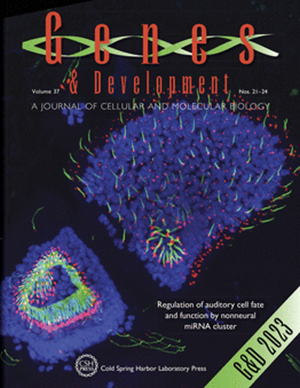限制子减缓RNAPII的延伸,促进在非编码RNA位点的终止
IF 7.7
1区 生物学
Q1 CELL BIOLOGY
引用次数: 0
摘要
真核生物基因组被RNA聚合酶II (RNAPII)广泛转录以产生蛋白质编码信使RNA (mrna)和一系列非编码RNA (ncRNAs)。尽管RNAPII在mRNA转录过程中具有很强的进程性,但它在许多ncrna合成过程中迅速终止,特别是那些在基因启动子或增强子上可接近的染色质上产生的ncrna。mRNA和ncRNA物种的不同命运引发了许多关于RNAPII和相关机制如何区分功能性转录和虚假转录的问题。限流器由RNA结合蛋白ZC3H4和rnapii相互作用蛋白WDR82组成,与抑制ncRNAs的表达有关。然而,限制特异性的决定因素和转录抑制的机制仍不清楚。在这里,我们使用无偏序列筛选和快速蛋白质降解,然后进行新生RNA测序来研究限流器。我们发现限制子混杂地抑制RNAPII的早期延伸,但这种活性在大多数mrna中被5 '剪接位点的存在所阻断。因此,限制子是在不同启动子处转录方向性的关键决定因素,并防止转录干扰。从机制上讲,我们发现限制子不是直接终止RNAPII,而是通过降低转录延伸率起作用,使RNAPII容易被其他机制提前终止。本文章由计算机程序翻译,如有差异,请以英文原文为准。
Restrictor slows RNAPII elongation to promote termination at noncoding RNA loci
The eukaryotic genome is broadly transcribed by RNA polymerase II (RNAPII) to produce protein-coding messenger RNAs (mRNAs) and a repertoire of noncoding RNAs (ncRNAs). Although RNAPII is very processive during mRNA transcription, it terminates rapidly during synthesis of many ncRNAs, particularly those that arise opportunistically from accessible chromatin at gene promoters or enhancers. The divergent fates of mRNA versus ncRNA species raise many questions about how RNAPII and associated machineries discriminate functional from spurious transcription. Restrictor, comprised of the RNA binding protein ZC3H4 and RNAPII-interacting protein WDR82, has been implicated in restraining the expression of ncRNAs. However, the determinants of Restrictor specificity and the mechanism of transcription suppression remain unclear. Here, we investigate Restrictor using unbiased sequence screens and rapid protein degradation followed by nascent RNA sequencing. We found that Restrictor promiscuously suppresses early elongation by RNAPII, but this activity is blocked at most mRNAs by the presence of a 5′ splice site. Consequently, Restrictor is a critical determinant of transcription directionality at divergent promoters and prevents transcriptional interference. Mechanistically, we show that rather than terminating RNAPII directly, Restrictor acts by reducing the rate of transcription elongation, rendering RNAPII susceptible to early termination by other machineries.
求助全文
通过发布文献求助,成功后即可免费获取论文全文。
去求助
来源期刊

Genes & development
生物-发育生物学
CiteScore
17.50
自引率
1.90%
发文量
71
审稿时长
3-6 weeks
期刊介绍:
Genes & Development is a research journal published in association with The Genetics Society. It publishes high-quality research papers in the areas of molecular biology, molecular genetics, and related fields. The journal features various research formats including Research papers, short Research Communications, and Resource/Methodology papers.
Genes & Development has gained recognition and is considered as one of the Top Five Research Journals in the field of Molecular Biology and Genetics. It has an impressive Impact Factor of 12.89. The journal is ranked #2 among Developmental Biology research journals, #5 in Genetics and Heredity, and is among the Top 20 in Cell Biology (according to ISI Journal Citation Reports®, 2021).
 求助内容:
求助内容: 应助结果提醒方式:
应助结果提醒方式:


